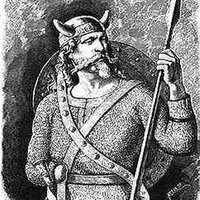
Tyr
CBUB Wins: 2
CBUB Losses: 1
CBUB Ties: 0
Win Percentage: 66.67%
Added by: Dinsdale Piranha
Read more about Tyr at: Wikipedia
Official Site: Public Domain
Týr ( ; Old Norse: Týr ) is a god associated with law and heroic glory in Norse mythology, portrayed as one-handed. Corresponding names in other Germanic languages are Gothic Teiws, Old English Tīw and Old High German Ziu and Cyo, all from Proto-Germanic * (* ). The Latinised name is Tius or Tio.
In the late Icelandic Edda, Tyr is portrayed, alternately, as the son of Odin (Prose Edda) or of Hymir (Poetic Edda), while the origins of his name and his possible relationship to Tuisto (see Tacitus' Germania) suggest he was once considered the father of the gods and head of the pantheon, since his name is ultimately cognate to that of *Dyeus (cf. Dyaus), the reconstructed chief deity in Indo-European religion. It is assumed that Tîwaz was overtaken in popularity and in authority by both Odin and Thor at some point during the Migration Age, as Odin shares his role as God of war.
Tiw was equated with Mars in the interpretatio germanica. Tuesday is in fact "Tīw's Day" (also in Alemannic Zischtig from zîes tag), translating dies Martis.
Old Norse Týr, literally "god", plural tívar "gods", comes from Proto-Germanic * (cf. Old English Tīw, Old High German Zīo), which continues Proto-Indo-European * "celestial being, god" (cf. Welsh duw, Latin , Lithuanian diẽvas, Sanskrit , Avestan daēvō "demon"). And * is based in *dei-, *deyā-, *dīdyā-, meaning 'to shine'.
CBUB Match Record:
No Regular Play Records Available
